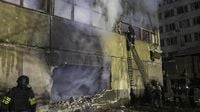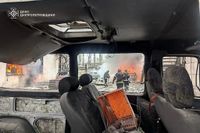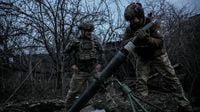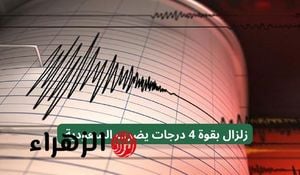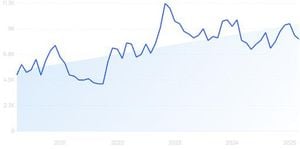On Thursday, April 3, 2025, the ongoing conflict in Ukraine witnessed another tragic escalation as a Russian missile strike killed four people in the city of Krivi Rig, the birthplace of President Volodímir Zelenski. This incident underscores the relentless violence that has marked the war since Russia's invasion began on February 24, 2022.
In the wake of the missile attack, the Russian Ministry of Defense accused Ukraine of launching assaults on its energy infrastructure, despite a supposed ceasefire agreement. The alleged attacks took place in the Kursk and Belgorod regions, resulting in widespread power outages for thousands of residents. Moscow characterized these actions as proof of Ukraine's failure to adhere to any potential agreements, while Ukrainian officials firmly denied the accusations, asserting that their forces were upholding the ceasefire.
During a NATO foreign ministers' meeting in Brussels, U.S. Secretary of State Marco Rubio reiterated America's commitment to the alliance, stating, "The President [Donald Trump] has made it clear that we support NATO. We are going to remain in NATO." Rubio emphasized the need for all member states to increase their defense spending to 5% of their GDP, a call that aligns with the heightened security concerns stemming from the ongoing conflict in Ukraine.
Meanwhile, Ukraine's air defense forces reported successfully shooting down 28 out of 39 drones launched by Russia earlier that morning, with damage reported in the Kharkiv, Donetsk, and Dnipropetrovsk regions. In response, Russia claimed to have intercepted 23 Ukrainian drones across six regions, illustrating the ongoing aerial confrontations between the two nations.
Spanish Foreign Minister José Manuel Albares, addressing his NATO counterparts, urged Russia to accept an unconditional ceasefire within a specific timeframe. He stressed that negotiations cannot continue indefinitely and that immediate action is necessary to pave the way for a lasting peace. Albares's remarks reflect a growing impatience among NATO allies regarding Russia's perceived delay tactics in peace talks.
Ukrainian Foreign Minister Andrí Sibiga also spoke at the NATO meeting, highlighting the importance of not allowing global trade wars to overshadow the large-scale war occurring in Europe. He emphasized, "While media attention is focused on global trade wars, we must not forget that there is a large-scale war in Europe," calling for increased pressure on Moscow to accept a ceasefire proposal that includes a 30-day halt to hostilities without preconditions.
On the battlefield, the situation remains tense. Zelenski visited the Sumy region, which borders the Russian Kursk region, reaffirming Ukraine's commitment to defend its territory. He stated, "We are working to protect our positions. We know what the enemy is thinking. In any case, we will defend our state, our independence, our people." This visit highlights the ongoing military engagements in areas critical to both sides.
In a notable development, the European Union's Kaja Kallas expressed optimism about the EU's capability to supply two million rounds of artillery ammunition to Ukraine by 2025. This commitment, if realized, would significantly bolster Ukraine's military capabilities as it continues to face Russian aggression.
General Christopher Cavoli, the top U.S. general in Europe, indicated that Ukraine has managed to address some of its troop shortages, although he warned that any interruption in U.S. military aid would be detrimental to Ukraine's war efforts. This statement comes amid concerns over the potential for reduced support from the U.S. government, following internal political discussions regarding military funding.
Additionally, Margarita Robles, Spain’s Minister of Defense, announced the establishment of the first Spanish defense industries in Ukraine, aimed at supporting the country amid its ongoing struggle against Russian forces. This move signifies a deepening commitment from European nations to assist Ukraine in its defense efforts.
As the conflict continues, Zelenski has reiterated that Ukraine will not agree to reduce the size of its military as a condition for peace. He emphasized that maintaining a strong army is a priority, stating, "For us, a strong army is a red line. No reduction of our army." This stance reflects Ukraine's determination to preserve its military strength in the face of ongoing threats.
Moreover, recent reports indicate that Russia has taken control of two settlements in eastern Ukraine, further complicating the situation on the ground. The Russian Defense Ministry claims these territorial gains are part of a broader strategy to secure its objectives in the region.
The ongoing tensions have also led to accusations from Russia that Ukraine has violated the energy truce established earlier this week. Both sides have engaged in a war of words, accusing each other of failing to adhere to ceasefire agreements, highlighting the fragile nature of any potential peace negotiations.
In a broader geopolitical context, the division between the United States and the European Union has been exploited by Russia, with officials in Moscow claiming that the EU is weakening. Maria Zakharova, a spokesperson for the Russian Foreign Ministry, stated, "The European Union is sinking. Its economy, politics, industry, and finances are all going downhill, that is evident." This rhetoric underscores the Kremlin's efforts to capitalize on perceived discord among Western allies.
In Bulgaria, the government successfully survived a motion of censure pushed by pro-Russian parties, indicating a political landscape that remains supportive of Ukraine's position within the EU framework. This development demonstrates the complexities of political alignments in Eastern Europe amid the ongoing conflict.
As the war in Ukraine marks its 1,136th day, the international community remains vigilant, with calls for renewed diplomatic efforts to achieve a ceasefire and a lasting resolution to the conflict. The situation continues to evolve, with both military and diplomatic fronts remaining active as the world watches closely.
